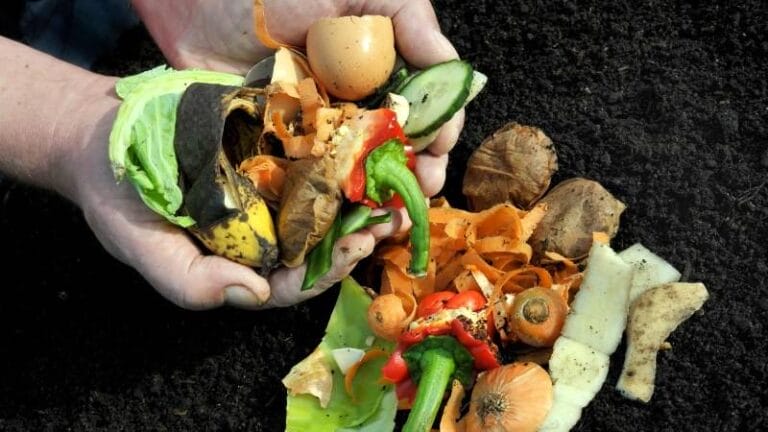Very few things excite me more in my garden than setting new plants in fresh homemade compost.
I know this makes me sound like a bit of a gardening nerd (or gardenerd as my kids call me).
But there is something very satisfying about knowing that all that organic food waste didn’t end up at a landfill and now will help grow more food and flowers.
One mistake you want to avoid is not giving your compost piles a kick start to speed up the process and give you much higher quality finished compost.
Here, I’ll explore how to elevate your composting game using various compost starters. From homemade concoctions to store-bought accelerators, I’ll guide you through choosing and using the right starter for your compost.
Whether you’re a seasoned gardener or a composting novice, these tips will help you create a more potent and productive compost in no time.
What Is a Compost Starter?
Ever wondered why your composting efforts sometimes seem slow? A compost starter might be the missing key.
This additive mixes with organic matter in your compost bin, kickstarting the natural decomposition process.
It’s like an invitation to microbes, urging them to join the decomposing party quicker.
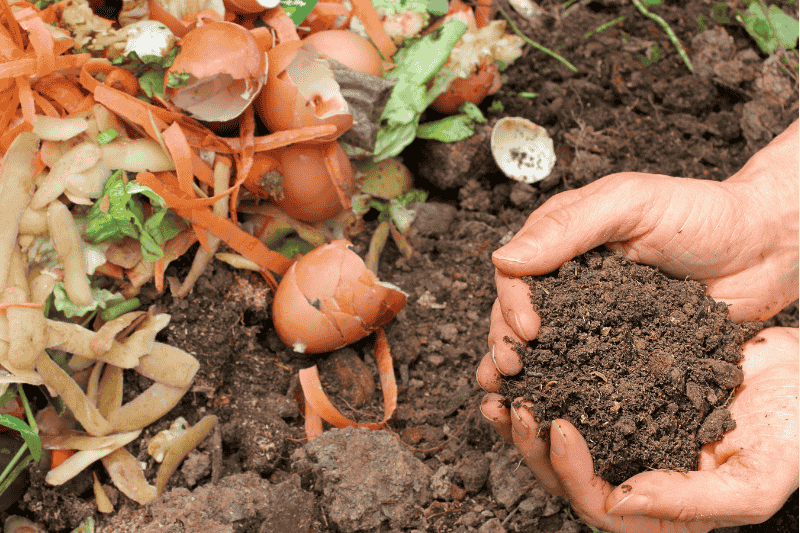
But it’s not just about speed. Introducing specific elements early on enhances your compost’s quality. For instance, elements that boost nitrogen levels create richer soil. This means better growth for your plants.
Sure, worms and garden waste contribute to the process. However, they alone might not do the trick quickly. The compost pile needs a bit more diversity to thrive fully. So, what are these magical elements? Things like coffee grounds or crushed eggshells make a big difference.
Do You Need a Compost Starter?
This question often pops up among gardening enthusiasts. The short answer: It’s not a must-have, but it sure can be beneficial. Let’s explore why.
Composting is, at its heart, a natural process. Microorganisms break down organic matter, even without any added starters. So, if patience is your virtue, your compost heap will eventually turn into nutrient-rich soil. However, it’s a slow dance with nature.
Compost starters step in to quicken this pace. They act as a catalyst, hastening the decomposition process. For those short on time or keen to see quicker results, a starter can be quite the boon. It’s akin to giving Mother Nature a gentle push. Imagine hitting the fast-forward button on a slow movie.
Consider your gardening ambitions. If speedy and efficient composting tops your list, a starter might just be what you need. It’s especially useful for beginners who are still mastering the perfect mix of green and brown compost materials.
However, let’s set the record straight: a compost starter isn’t a fix-all solution. It won’t miraculously transform a poorly maintained compost pile. Proper balance and regular upkeep are still key.
So, while a compost starter isn’t essential, it offers clear advantages. It speeds up the process and simplifies composting, particularly for those just starting out. The choice ultimately hinges on your composting approach and how swiftly you wish to see your garden thrive.
Things to Consider Before Buying a Compost Starter
Before choosing a compost accelerator, there are essential factors to consider. This decision can significantly impact the efficiency and quality of your compost.
Organic Vs Non-Organic
This is crucial, especially for organic gardeners.
Always check the ingredients of a compost starter. You want to avoid synthetic chemicals, as they might not break down and could compromise the organic nature of your compost.
Size Of The Compost Heap
The scale of your composting efforts matters. Those with larger gardens and multiple heaps need more than a standard-sized compost starter.
Typical products cater to small bins for kitchen waste. But adding garden waste increases the heap size, necessitating a larger amount of accelerator.
Consider The pH
Managing pH levels is vital for specific plant needs. I use two rotating compost bins to target different pH requirements.
For acid-loving plants like blueberries, I add organic iron sulfur to lower the pH.
Conversely, if your plants prefer a higher pH, choose a compost starter that introduces lime for alkaline conditions.

Read More:
What Are Good Compost Starters?
When starting a fresh compost pile, there are four key elements I always rely on for the best results.
1. Nitrogen
Maintaining the right balance of green (nitrogen-rich) and brown (carbon-rich) materials is crucial.
Sometimes, it’s challenging to add enough green waste, like kitchen scraps or grass clippings, which are vital for providing nitrogen. Organic options like soy or alfalfa meal are great, but chicken manure often yields the best results when sprinkled into your compost bin.
2. Oxygen
Both worms and microorganisms need ample water and oxygen.
A lack of oxygen can halt the composting process, leading to un-decomposed materials. In bin composting, regularly rotating the bin helps aerate it.
For larger piles, constructing a base from heavy sticks ensures better airflow.
3. Microorganisms
While worms start the process, microorganisms play a critical role in breaking down organic matter.
These microbes naturally develop as waste begins to rot, but adding them via an activator kit can speed up the process.
Available at most garden centers, these kits should be evenly distributed in layers throughout the pile.
4. Shredders
Smaller waste pieces decompose faster, so chopping up your compost material is beneficial. For larger piles, consider investing in a mechanical shredder, available at garden centers.
The increased surface area from finely shredded material drastically speeds up decomposition.

Read More:
What Should You Not Use as a Compost Starter?
When it comes to supercharging your compost, it’s just as important to know what not to add as a starter. Here are a couple of things to avoid:
1. Lime
Often used in agriculture to increase soil pH, lime might seem like a good addition to compost.
However, the initial acidity in a compost pile is natural and necessary. It helps break down organic materials and eliminates harmful bacteria and pathogens.
If you’re worried about the acidity, it’s better to check the pH and nitrogen levels at the end of the composting process. Only if the pH is below 5 should you consider adding lime, and that’s right before using the compost for planting.
2. Wood Ash
While it’s a good nutrient source for soil, especially in counteracting acidity, wood ash isn’t ideal for a compost pile. Its nutrients can easily wash away without binding to the decomposing material.
Instead of adding it to your compost, it’s more beneficial to mix wood ash into your soil just before planting.
How Do Compost Starters Work?
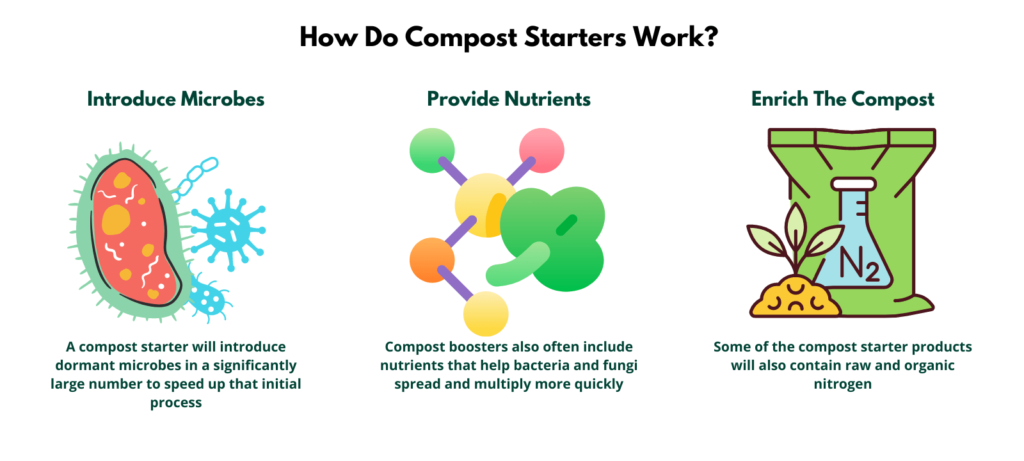
Compost starters enhance the composting process by adding a blend of minerals, organic material, and beneficial microbes. Normally, these elements take weeks or even months to accumulate naturally. However, using a homemade or store-bought compost starter can significantly speed up this process.
Let’s delve deeper.
Introducing Microbes
Kitchen scraps naturally attract fungi and other microbes, but this is a slow affair. The initial signs of mold take time to dominate the food waste.
Compost accelerators step in here, introducing a large number of dormant microbes. This boosts the initial decomposition stage significantly.
Providing Nutrients
Next, compost boosters come into play. They often include nutrients that aid bacteria and fungi in spreading and multiplying faster.
Under ideal conditions, these nutrient-rich additions can shave weeks off the composting timeline.
Enriching the Compost
Many compost starter products also contain nitrogen-rich organic materials. This is crucial when the compost is eventually used for planting.
The added nitrogen markedly improves conditions for seedlings and mature plants. As a result, you get more bountiful crops and vibrant flowers.
Tips To Speed Up Your Compost
1. Keep Rotating The Compost
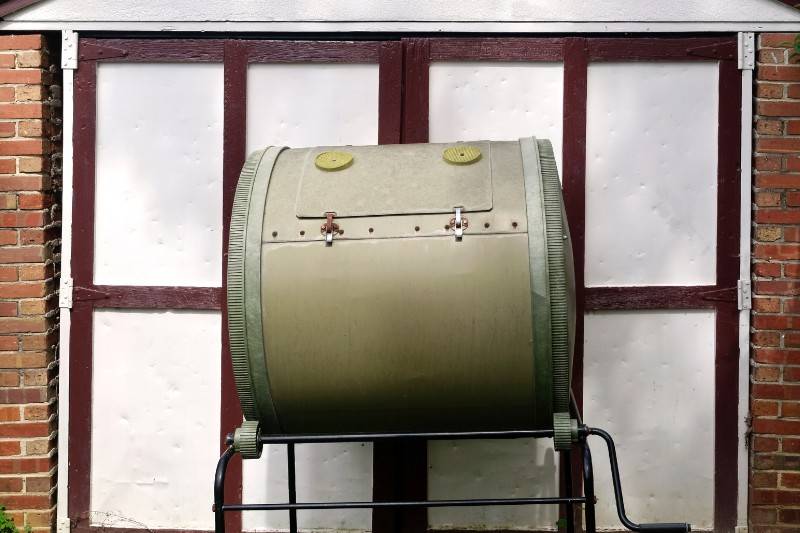
This is particularly important in the early stages when the microbes could concentrate in small pockets.
Mixing up the materials will spread out the microbes and deliver some fresh oxygen to your compost as well.
2. Avoid Huge Piles
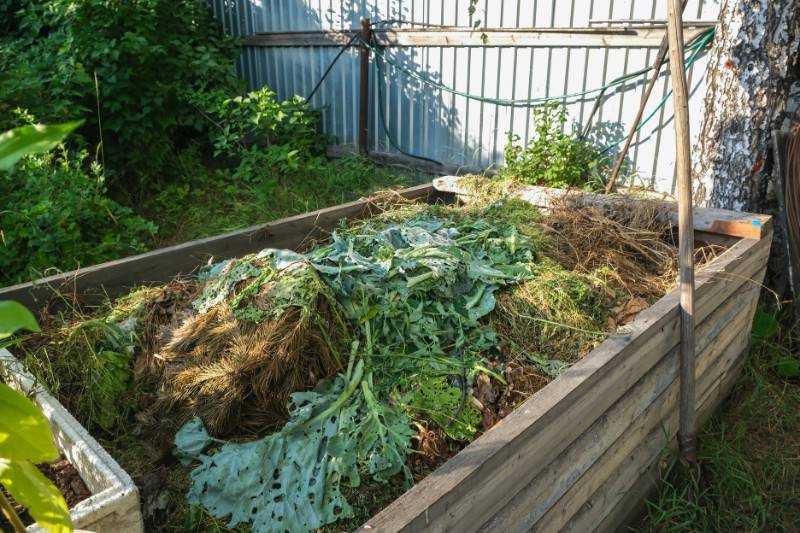
If you have a large family and garden, your composter can quickly fill up with a lot of organic matter.
However, keeping multiple smaller compost piles of about a 3-foot cube can bring the core temperature up quicker for faster decomposition.
3. Balance Your Greens And Browns
You want to make sure that you don’t just end up with food waste and fresh garden clippings, as this will give you the wrong balance of nitrogen and carbon-rich products.
Make sure you regularly sprinkle dried leaves, sawdust, and even shredded paper to your compost to add more carbon.
4. Don’t Forget To Water The Pile
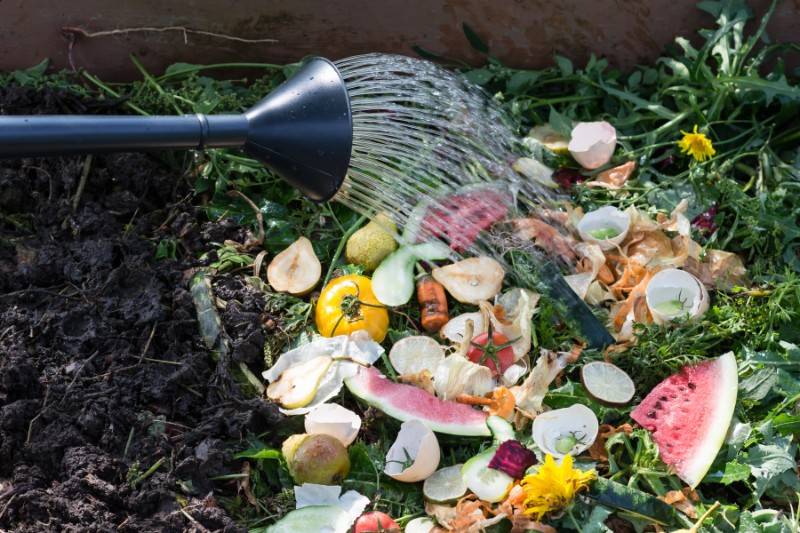
I tend to sprinkle some water on my pile every few days to keep it moist.
It’s essential not to make it saturated, So, you need to adjust the amount of water between summer and winter.
As easy as it gets!
5. Use An Insulated Bin Composter
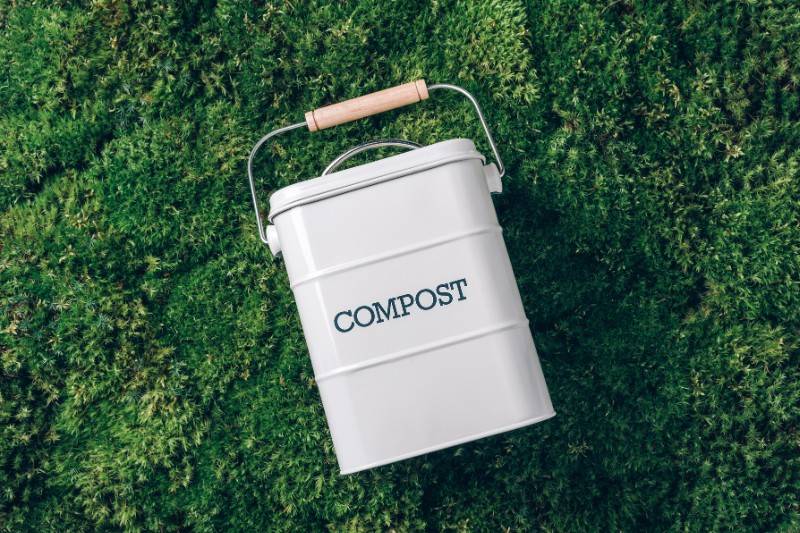
Worms and microbes love some heat, and they will thrive in warm conditions.
But in the colder months of the year, your pile’s core can get a bit cooler, which would slow down the process. To prevent that, use an insulated bin composter. The one that I use is the popular Worm Factory 360.
6. Remember Those Worms
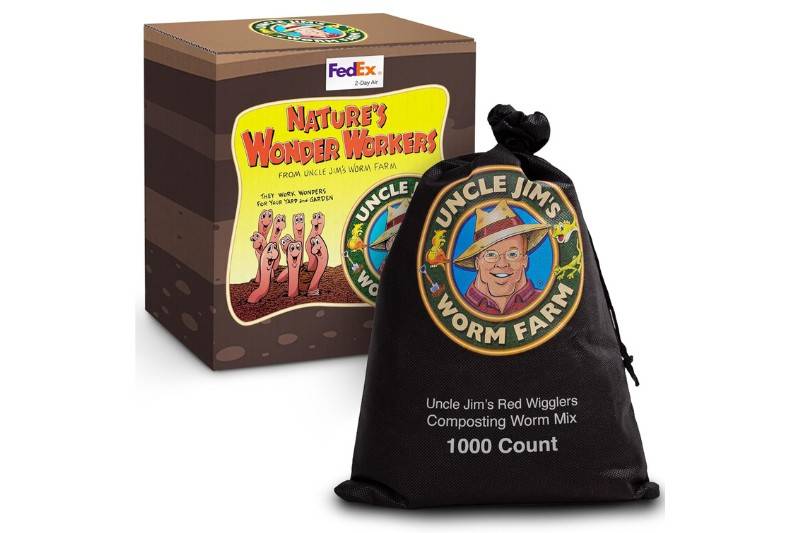
Head to your local fishing and tackle store regularly to introduce more worms to your pile.
I myself get mine from Uncle Jim’s Worm Farm.
This might be especially important if you’ve had an unusually cold spell of weather when worms can quickly die.
How Do You Make a DIY Compost Starter?
If you like doing as much as you can with some materials you already have at home, then this is what you need to do.
1. Collect The Materials for DIY Compost Starter
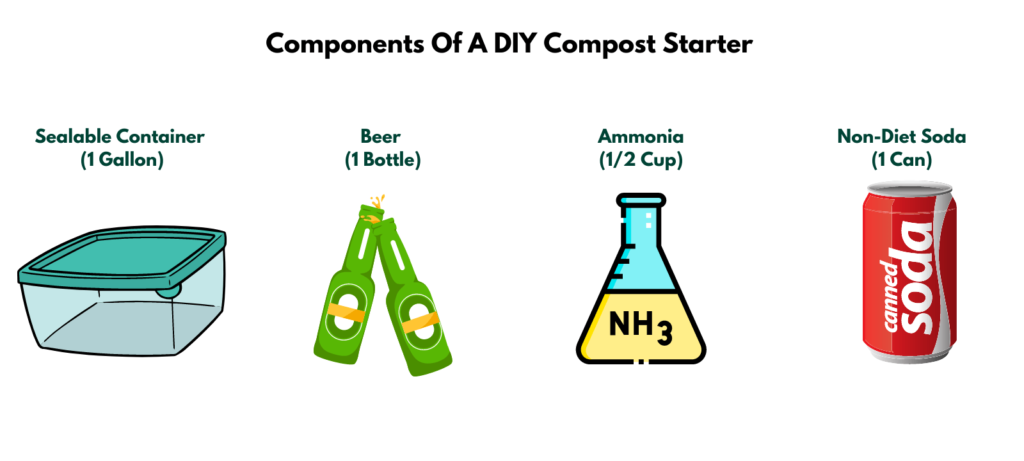
Here’s a shortlist of what you’ll need:
| Sl.No. | Component | Size/Amount |
|---|---|---|
| 1 | Sealable Container | 1 Gallon |
| 2 | Beer | 1 Bottle |
| 3 | Ammonia | 1/2 Cup |
| 4 | Non-Diet Soda | 1 Can |
2. Mix It All Up
There’s no real skill involved in this step. Just add the beer, soda, and ammonia products into the container and top it up with water.
You won’t need all of it in one go, which is why I suggest using a sealable container.
3. Sprinkle The Mix
Every few days, you’ll want to add some of this solution, but avoid just dumping it in one place. Use a watering can with a sprinkler head instead.
The idea behind the mix is that the yeast from the beer will digest some brown materials. The ammonia is rich in nitrogen, and the sugar from the soda will help feed the bacteria and grow the colonies.
If that sounds too messy, then let me show you some products I depend on.
5 Best Compost Starter Brands Available on the Market
Here are five compost starter brands that I regularly rely on for more efficient composting.
1. Jobe's Organics Compost Starter
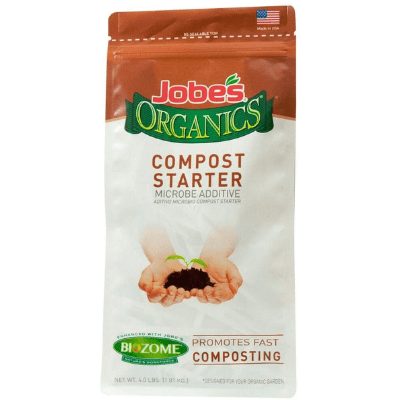
Jobe’s Organics stands out as a brand deeply committed to sustainable gardening.
Their Compost Starter Granular isn’t just another compost accelerator—it’s enriched with Jobe’s Biozome®, a proprietary blend of beneficial microorganisms, including mycorrhizal fungi, archaea, and healthy bacteria.
This special mix enhances soil fertility, speeds up decomposition, and helps plants grow stronger while reducing the risk of disease. Unlike synthetic fertilizers that can harm ecosystems, Jobe’s Organics focuses on organic, pet-safe, and environmentally friendly solutions.
Their commitment to sustainability extends beyond their products; they advocate for regenerative gardening practices that restore soil health rather than deplete it.
They make composting easier for environmentally conscious gardeners who want to enrich their soil without leaving a heavy footprint on the planet.
2. SCD Probiotics - All Seasons Bokashi
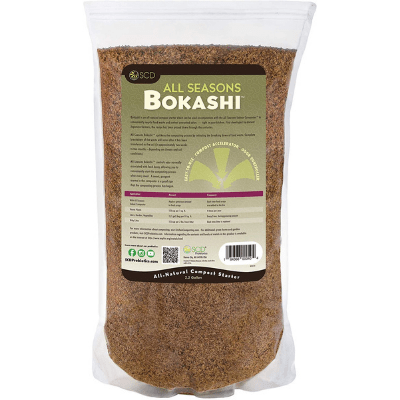
SCD Probiotics takes composting to a new level with its All Seasons Bokashi starter.
Unlike traditional aerobic composting, which releases carbon dioxide, the Bokashi method ferments food scraps anaerobically, locking in more nutrients while producing less greenhouse gas. This means richer compost, better soil structure, and fewer emissions—an all-around win for the environment.
What sets SCD Probiotics apart is their foundation in microbial science. They harness beneficial bacteria to accelerate natural processes, making composting faster and more efficient. Their commitment to sustainability extends beyond their products, as they promote a closed-loop system where food waste is repurposed rather than sent to landfills.
The company actively encourages eco-friendly habits, helping people transition to a more sustainable lifestyle while reducing household waste and improving soil health.
3. Convino Compost Starter
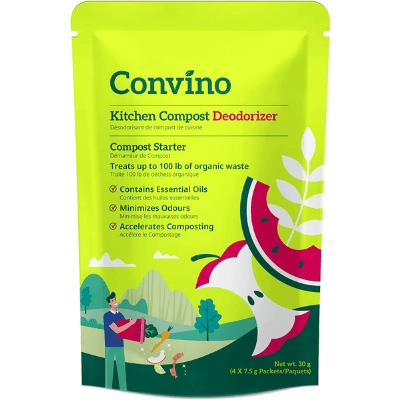
Convino remains somewhat of an enigma in the sustainability space.
While their compost starter product claims to utilize bioenzymes to accelerate decomposition and control odors, there’s little publicly available information about their broader environmental initiatives. Their focus appears to be on making composting more convenient, particularly for those concerned about smell and efficiency.
However, without clear transparency on their sourcing, manufacturing ethics, or sustainability commitments, it’s difficult to determine how deeply the brand is invested in eco-friendly practices. That said, any product that encourages composting—especially one designed to make the process easier—contributes positively to reducing food waste and supporting a circular waste system.
More clarity on their environmental policies would help position them as a leader in sustainable composting solutions.
4. Biomaster Compost-It Compost Accelerator/Starter
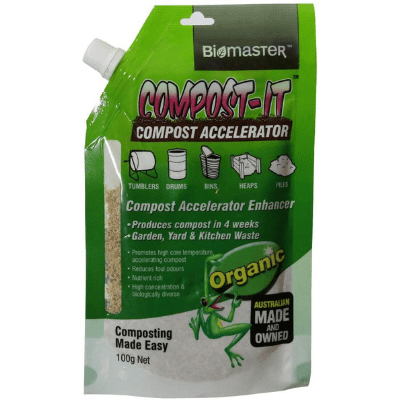
Biomaster’s Compost It® Sprout Pack is designed to supercharge the composting process, but its significance goes beyond just breaking down organic material.
The brand positions itself as an advocate for reducing food waste at the consumer level, making composting more accessible to urban dwellers and home gardeners alike.
While Biomaster doesn’t market itself as aggressively as some competitors, its product speaks for itself—offering an easy, natural way to accelerate decomposition. By enhancing microbial activity, their compost starter ensures that organic waste turns into nutrient-dense compost rather than lingering as landfill-bound trash.
Although detailed sustainability initiatives from Biomaster are scarce, their emphasis on waste reduction aligns with broader environmental goals, helping individuals take an active role in minimizing organic waste and enriching their gardens.
5. Green Pig 60 Accelerator
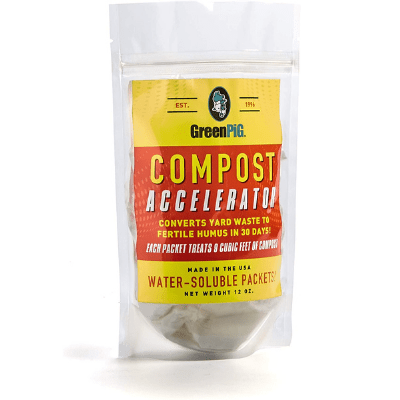
GreenPig Solutions approaches sustainability from a practical, results-driven angle. While they are best known for their septic system treatments, their compost accelerators reflect a similar commitment to breaking down waste efficiently.
Their compost starter speeds up decomposition, turning food scraps into usable compost in a fraction of the time.
Though they don’t market themselves as an explicitly eco-friendly brand, their products naturally contribute to sustainability by keeping organic waste out of landfills and promoting nutrient recycling.
For households looking for a straightforward way to reduce waste without complicated composting systems, GreenPig Solutions provides a functional approach that aligns with sustainable living, even if their branding doesn’t place environmental activism at the forefront.
Frequently Asked Questions (FAQ)
You can use a variety of materials as a compost starter, such as well-rotted manure, garden soil, finished compost, or specially formulated compost accelerator products. Kitchen scraps like fruit and vegetable peels, coffee grounds, and eggshells also work well to kickstart the composting process.
Start your compost with a balanced mix of ‘greens’ (kitchen scraps, grass clippings) and ‘browns’ (dry leaves, straw, cardboard). Adding garden soil or finished compost can introduce beneficial microbes. Ensure a balance for effective decomposition, aiming for roughly equal parts green and brown materials by volume.
A compost starter isn’t essential, but it can be helpful, especially for beginners. It speeds up the decomposition process by introducing beneficial microbes and nutrients. If you’re patient and maintain a good balance of materials, your compost will naturally develop these elements over time.
A good compost activator can be homemade, like well-rotted manure or garden soil, or commercially available starters rich in microbes and nutrients. Kitchen scraps, such as coffee grounds and fruit peels, are also effective, introducing essential elements to stimulate the composting process efficiently.
To kickstart compost, balance ‘green’ materials (like kitchen scraps and grass clippings) with ‘brown’ materials (such as dry leaves and cardboard). Introduce a compost starter or activator, like well-rotted manure or garden soil, to supply beneficial microbes. Regularly turn the pile to aerate and facilitate decomposition.
The Secret to Faster, Healthier Compost
Jumpstarting your compost with a quality compost starter isn’t just about speeding things up—it’s about creating the richest, most nutrient-dense soil possible.
Composting naturally takes time, but by adding a starter like well-rotted manure, garden soil packed with microbes, or a specially formulated compost accelerator, you supercharge the process. These additions flood your compost with beneficial bacteria and fungi, ensuring organic matter breaks down faster and more efficiently.
But it doesn’t stop there. Regularly turning your pile keeps oxygen flowing, preventing foul odors and encouraging even decomposition. By fine-tuning the balance of greens and browns and giving your compost the boost it needs, you’re not just reducing waste—you’re creating a powerhouse of organic nutrients for your garden.
Healthier compost means healthier soil, leading to stronger plants, better water retention, and a garden that thrives with minimal effort.
